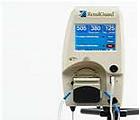Stem cells will usher in the era of regenerative medicine, allowing the creation of cells, tissues and organs to treat or cure diseases and injuries. This will be a fundamental alteration in our approach to medical care and a transformational medical megatrend. And it will be very “personalized medicine” to provide the specific individual with custom tailored new cells and tissues for organ repair or replacement.
Stem cells will usher in the era of regenerative medicine, allowing the creation of cells, tissues and organs to treat or cure diseases and injuries. This will be a fundamental alteration in our approach to medical care and a transformational medical megatrend. And it will be very “personalized medicine” to provide the specific individual with custom tailored new cells and tissues for organ repair or replacement.
Extensive use of stem cells as therapy is still in its infancy. Call it infancy because there is so much basic science still to be understood, that it will be quite some years before we will see stem cells being used on any sort of regular basis to treat diabetes, Parkinson’s disease, or heart failure after a heart attack. But time flies, many investigators are hard at work and the science may advance quickly.
There are exceptions; stem cells are being actively used for a few situations and have been for many years. Among them are “bone marrow” or stem cell transplantation for diseases like leukemia, some cancers being treated with very high doses of chemotherapy or some individuals, especially children, with immune disorders.
Since stem cells have the potential to be of ever increasing importance to medical care, albeit not for a few years, it is important to understand just what a stem cell is, generally how the various types of stem cells differ from each other and how they are either found in the body or produced in the laboratory. The key characteristics of stem cells are that 1) they can replicate themselves and 2) they can become mature cells that make up the tissue and organs of the body.
Embryonic stem cells are found in the earliest divisions of the fertilized ovum and can become any of the body’s approximately 200 types of cells (liver, lung, brain) and they have the capacity when placed in tissue culture in the laboratory to divide and to replicate themselves indefinitely. We call them pluripotent in that they can become any of the various types of cells in the body. Think of them as the most fundamental cellular building block that can create the tissues and organs of our body.
Adult stem cells, as the name implies, can be found in the bodies of adults (or newborns and children for that matter.) They also can self replicate but when placed in tissue culture it has not been possible to have them replicate indefinitely as embryonic stem cells do. Adult stem cells generally only can differentiate into one type of the body’s cells or tissue, i.e., are unipotent. For example muscle stem cells only become muscle cells but not liver cells. But some adult stem cells, such as those from the bone marrow, can become multiple but not all types of cells. Stem cells obtained from the umbilical cord of a newborn baby are more like adult stem cells in that they can develop into some but apparently not all cells types. In effect, they are further along in the chain of differentiation.
There are also other types of stem cells that as of now are being produced in the laboratory and which have many of the attributes of embryonic stem cells – nuclear transfer, induced pluripotent, and protein-induced pluripotent stem cells, among others. To create the nuclear transfer stem cell, an unfertilized egg is obtained from a woman’s ovary. The egg has its nucleus extracted by a micropipette and then has the nucleus of an adult cell inserted in its place. This nucleus might be obtained from a skin cell taken from the arm of a patient with a particular problem such as diabetes. The newly created cell is placed in culture and with the appropriate signals begins to act like an embryonic stem cell in that it will divide and replicate itself and with the appropriate signals the daughter cells can become various body cell types. The hope is that these cells, genetically identical to the patient who had the skin biopsy, could be grown up into a vast number of – in this example – pancreatic islet cells and used to treat this individual patient’s diabetes.
The induced pluripotent stem cell (or iPSC) also has many of the embryonic stem cells’ characteristics. It is produced by taking a person’s cells such as from the skin of the arm and then stimulating them by inserting a few key genes, using a retrovirus. These genes reprogram the cell to revert to what is similar to an embryonic stem cell. The concern of course is that it is induced using a virus. More recent experiments have found that certain proteins can reprogram the cell just as can the virally-inserted genes. These stem cells are known as protein-induced pluripotent stem cells (piPSC). Both are being evaluated to determine if they can be as effective as embryonic stem cells. With each of these three techniques, a clear hoped for advantage is that a person can donate his or her own cells for transformation into stem cells and from there into whatever cell is of interest, such as pancreatic islet cells that secrete insulin. Such cells transplanted back into the person would be recognized as “self” and not trigger rejection with a graft vs. host response by the body. This concept with each technique is therefore all about “personalized medicine.”
Next week I will delve more deeply into adult stem cells followed the next week by embryonic stem cells. But in the meantime think of stem cell science as one more of those truly transformative megatrends that will revolutionize the practice of medicine in the years to come and in the process improve the healthcare of you and your family.






